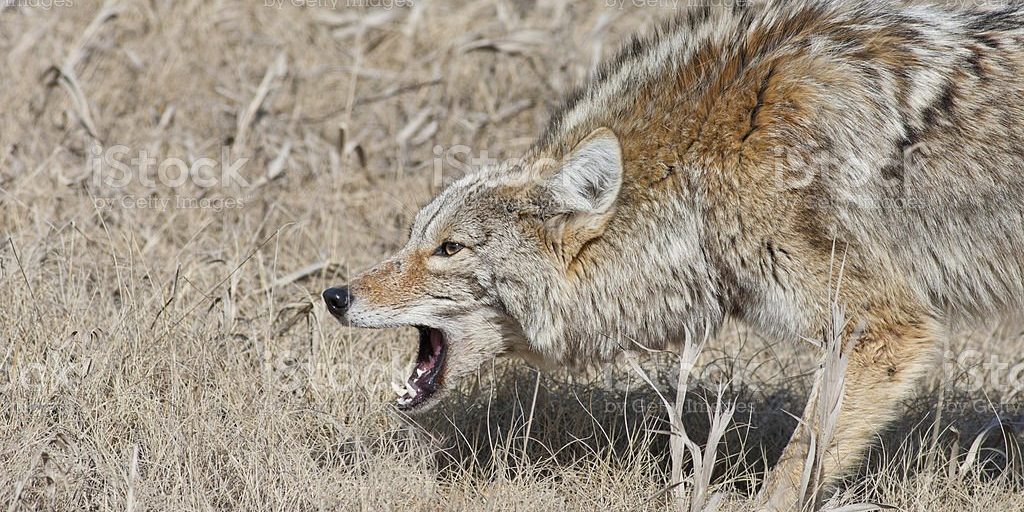Video: Here’s what to do if you come across a coyote in Mississauga
Published October 3, 2022 at 2:31 pm

Mississauga officials continue to aggressively drive home their message to residents that coyotes are not something to be played with–or fed.
In their latest communication to residents on the subject, City of Mississauga officials posted a video to Twitter today (Oct. 3) showing people what to do if they should encounter a coyote while out and about in their neighbourhoods and parks.
The short video (see below) visually supports the ongoing message that anyone who crosses paths with a coyote should make noise and appear large in order to scare away the wild animal.
In ongoing efforts to get people to stop feeding coyotes and other wildlife across the city, Mississauga officials have tried to deliver that message by repeatedly warning residents of the potentially hefty fines for such activity.
They’ve also posted more signs–and newer signs with more clear messaging–throughout parks and neighbourhoods in an attempt to reach more people.
Additionally, City of Mississauga Animal Services staffers were out in force during the summer to let residents know of the dangers of either purposely feeding the wild animals or doing so inadvertently by not securing food scraps placed at the curb for waste pickup.
Encounter a coyote?
🔊 Appear larger, make lots of noise, clap, yell, throw rocks or sticks near it, not at it
🚫Don't run or turn your back: Walk away slowly
🚶 Get to a more public place with activity & noise📞Animal Services: 905-896-5858
🔗https://t.co/LkTJswlG3T pic.twitter.com/eEU2lwIo4Y
— City of Mississauga (@citymississauga) October 3, 2022
And one Mississauga councillor even suggested a few months ago that the City use graphic photos of dying coyotes on signs to get the message across to residents.
Faced with a dramatic increase in the number of reported coyote sightings across the city this past spring, Mississauga officials began to ramp up efforts to get the message out as late spring and summer approached.
Mississauga Animal Services had received more than 370 reports of sightings in the previous four months–many of those in a specific area of the city and repeated sightings of the same coyotes.
That suggested, officials say, that people were feeding the wild animals, intentionally or not.
Ward 3 Councillor Chris Fonseca said at the time that the feeding of coyotes by residents, both intentional and unintentional, had spiraled out of control in her part of the city.
In Mississauga, residents are reminded that the feeding of coyotes, and all wild animals, is illegal and carries a $300 fine.
Under the City’s Animal Care and Control Bylaw, the feeding of wildlife includes leaving food out, food waste and disposing of food in natural areas.
City officials say coyotes can be found in natural areas, including in both suburbs and cities, across North America.
“Coyotes are intelligent, adaptable and resourceful animals who have found a permanent home in Mississauga. They are an important part of our ecosystem and contribute to keeping it healthy by managing wildlife populations and keeping them under control,” the City said.
“A coyote diet consists of mostly berries, nuts and smaller animals like rabbits, geese, rats, raccoons and squirrels. In Mississauga, people are continuing to feed or leave food outdoors for wildlife. This is a concern as feeding coyotes and other wild animals can increase their presence and causes them to lose their fear of people.”
The City adds that most interactions with coyotes are the result of accessible food sources and intentional feeding by residents.
“This creates a long-term problem for both the wildlife and Mississauga neighbourhoods,” City officials say.
Officials say if you are seeing coyotes in your neighbourhood, to:
- never feed them
- be cautious when eating outdoors
- don’t leave food outdoors
- discard food scraps or waste properly in parks and greenspaces
- bring in all outdoor pet food as soon as it’s consumed
- ensure full garbage and compost bins aren’t left out overnight
To report wildlife feedings or an aggressive, sick or injured coyote, call 905-896-5858.
INsauga's Editorial Standards and Policies


